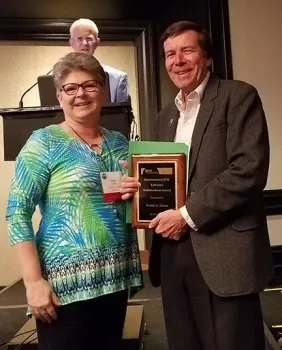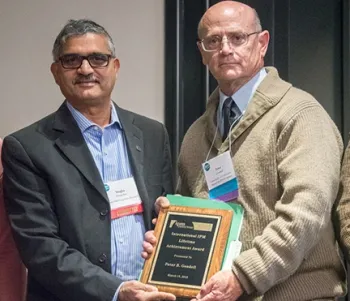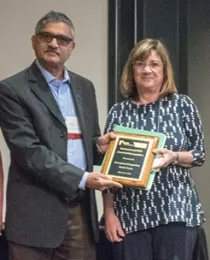
Lifetime achievement awards went to Frank Zalom, distinguished professor of entomology, UC Davis Department of Entomology and Nematology, who directed the UC Statewide IPM Program (UC IPM) for 16 years; and to Pete Goodell, Cooperative Extension adviser emeritus and UC IPM emeritus.
An international IPM award of recognition went to the European Grapevine Moth Team, headed by Lucia Varela, UC IPM advisor, and including Professor Zalom.
Officials lauded the honorees with these tributes:
Frank Zalom
"Frank Zalom began his career as an assistant professor for the Department. of Entomology, Fisheries, and Wildlife at University of Minnesota, St. Paul, in 1979. Over the years his career has spanned a wide range of positions and leadership to IPM programs worldwide. In 1986, he became the director of UC Statewide IPM Program and directed it for 16 years to raise the UC IPM program to its 'gold standard' of IPM information in the world. He received a Joint Resolution from the California State Legislature lauding his efforts to advance IPM.
"Frank Zalom's beliefs for IPM are four-fold:
- To solve pest control problems using effective, biologically-based pest management approaches
- To provide IPM leadership at the regional, state, national and international levels
- To provide a vigorous research program in entomology, especially related to IPM and invasive species; and
- To educate a new generation of IPM practitioners through effective undergraduate teaching and graduate student mentoring.
"He believes that advancing the science and implementation of IPM will reduce the impact of pests and pest control on agriculture and the environment. This is critical in California. 'California agriculture is a $42.6 billion industry that generates at least $100 billion in related economic industry,' according to the California Department of Food and Agriculture, and California grows more than a third of the country's vegetables and two-thirds of the nation's fruits and nuts.
"He has pursued these goals through a combination of fundamental studies related to pest biology, physiology, and community ecology; problem-focused, hypothesis-driven management research; and community-oriented extension efforts. His research focuses on exploiting weaknesses in the biology of a pest species and its niche in the agroecosystem or the broader landscape. He builds multidisciplinary research and outreach teams to pursue innovative ideas needed to solve major IPM challenges. His lab's research has addressed seventeen invasive species introductions: among them southern green stink bug, silverleaf whitefly, glassy-winged sharpshooter, olive fly, invasive salt cedar, light brown apple moth, spotted wing drosophila, and most recently European grape vine moth, brown marmorated stink bug and Bagrada bug." (See more about his career on UC Davis Depatment of Entomology and Nematology website.)
Peter Goodell

"Early in his career, Goodell focused on reduction of use of broad-spectrum insecticides and development of easy to implement scouting methods. For example, he was instrumental in the development and adoption of time saving presence/absence sampling for mites in cotton. Mid-career, Goodell helped to pioneer year-round IPM programs because of his collaborations with the Natural Resources Conservation Service. Year-round IPM programs describe pest management activities important for that crop stage or season and addresses key pest management for multiple pests. This departed from addressing one pest to a more holistic program focused on prevention and decision-making. UC IPM now has year-round programs for 25 crops and recently expanded the concept to develop seasonal landscape IPM checklists for four eco-regions in California. Later, Goodell was one of the first to incorporate social science concepts regarding the drivers of change in behavior into IPM learning and adoption. He was a founding member of the group that developed the Toolkit for Assessing IPM Outcomes and Impacts.
"To end his career, Goodell is leading a California Department of Pesticide Regulation (DPR) funded project to host discussions on pests, pesticides, and IPM broadly throughout California. At the foundation for this project, it assumes that pests are part of every persons' experience and pest management is necessary to protect society. The hope is the project will generate a consensus statement about risks from pests and pesticides and provide direction for the future of IPM in California. That will be an incredible final accomplishment for Dr. Goodell's career and for IPM everywhere." (See more about his career on the UC ANR website.)
European Grapevine Moth Team

"The European Grapevine Moth Team was selected for an IPM Team Award for achieving the eradication of European grapevine moth only six years after its discovery in 2009. Team members helped growers in infested counties to monitor the pest and apply control measures on a timely basis. The team's research and extension efforts helped growers avoid losses to the pest every year until it was finally eradicated in 2016.
"In September 2009, European grapevine moth (EGVM) was detected in grapes in Napa County and confirmed by USDA on Oct.7, 2009. European grapevine moth larvae bore holes into grape berries directly damaging the fruit and allowing entry of fungal pathogens. The European Grapevine Moth Team, achieved the eradication of European grapevine moth only six years after its discovery.
"The team mounted a multi-pronged program to study the biology and life cycle under California conditions, assisted and informed growers to monitor and control this pest, and addressed regulatory questions regarding detection and delimitation. The team designed and conducted 15 trials to evaluate winter mortality factors, validate monitoring tools, determine the host range, evaluate organic and conventional insecticides, and study larval mortality during the winemaking process."
The European Grapevine Moth Team includes Lucia Varela, UC IPM advisor for the North Coast; Frank Zalom,IPM specialist and distinguished professor of entomology, UC Davis Department of Entomology and Nematology; Monica Cooper, UC Cooperative Extension viticulture adviser in Napa County; Walter Bentley, UC IPM entomologist emeritus; Larry Bettiga, UC Cooperative Extension adviser in Monterey County; Kent Daane, UC Cooperative Extension specialist in UC Berkeley Department of Environmental Science, Policy and Management; Rhonda Smith, UC Cooperative Extension adviser in Sonoma County; Robert VanSteenwyk, UC Cooperative Extension specialist in UC Berkeley's Department of Environmental Science, Policy and Management; and Joyce Strand, UC Davis IPM Academic Coordinator emeritus.

